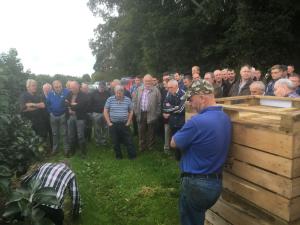Over 60 apple growers recently attended the annual orchard walk hosted at the Millennium orchard in AFBI Loughgall.

Dr Seán Mac an tSaoir who leads apple research in AFBI outlined the results of the current DAERA / Top Fruit Industry funded project investigating best practices for apple storage. Bramley is the only main apple crop in the British Isles which requires long term storage since it cannot be supplied from the Southern hemisphere out of season. However, the continued removal of previously-used ‘loss-prevention’ treatments to the crop during storage has become a significant challenge for growers.
Growers have responded to this challenge through the use of ethylene control measures and the gradual move to low oxygen stores, but the proportion of rotted fruit now coming out of the stores has become the most recent challenge for both growers and processors.
Apple canker is the main problem disease causing rot during storage and once fruit have become infected, there is no available treatment. Given that fruit in storage cannot be treated, management of the disease in the orchard is the only feasible way to protect the crop. Previous research undertaken at AFBI Loughgall provided the industry with effective treatments during the particularly sensitive period of petal fall after pollination. However, the level of ‘canker rots’ have continued to increase over time.
Normally, a 5% loss due to rot is seen as commercially acceptable, but results from the 2016-17 storage season were particularly alarming with losses of over 50% reported on some farms (which had previously kept the disease within manageable levels). Further analysis of the data collected from growers highlighted the level of rot loss of up to 15% in ‘good’ orchards’ and 22% loss in a smaller number of ‘poor’ orchards
A key factor contributing to the high levels of disease was identified as the use of ‘M9 rootstock’. The average age of the M9 rootstock was 12 years and this represents half of the rootstock used. Whilst it is most suitable for the high density plantings which are now the norm, it is known to be susceptible to wet soil and impaired drainage problems.
Dr Mac an tSaoir reported to the meeting that storage problems with the M9 rootstock were common place during the 2016/17 season in Europe and Eastern USA. The general consensus was that the very wet winter of 2015/16 had exacerbated the M9 root rot issue with the trees badly weakened going into the 2016 growing season. It was highly likely that the three months of continuous water logged soil had facilitated the development of apple canker within the trees and subsequently within the fruit.
Dr Mac an tSaoir demonstrated a new practice, which AFBI Loughgall are currently investigating, which combines a simple tree injection system with new chemistry to potentially control canker rot in Bramley trees.
Notes to editors:
AFBI carries out high quality technology research and development, statutory, analytical, and diagnostic testing functions for DAERA and other Government departments, public bodies and commercial companies.
AFBI's Vision “Advancing the Local and Global Agri-Food Sectors Through Scientific Excellence”.
All media enquiries to AFBI Press Office
Latest news
- AFBI issues Nematodirus warning – Spring 2025 11 April 2025
- Managing Nature Based Risks to the UK Economy and Opportunities for Green Finance 08 April 2025
- The Omics Days Conference 27 March 2025
- AFBI Hillsborough host AERA committee 27 March 2025
